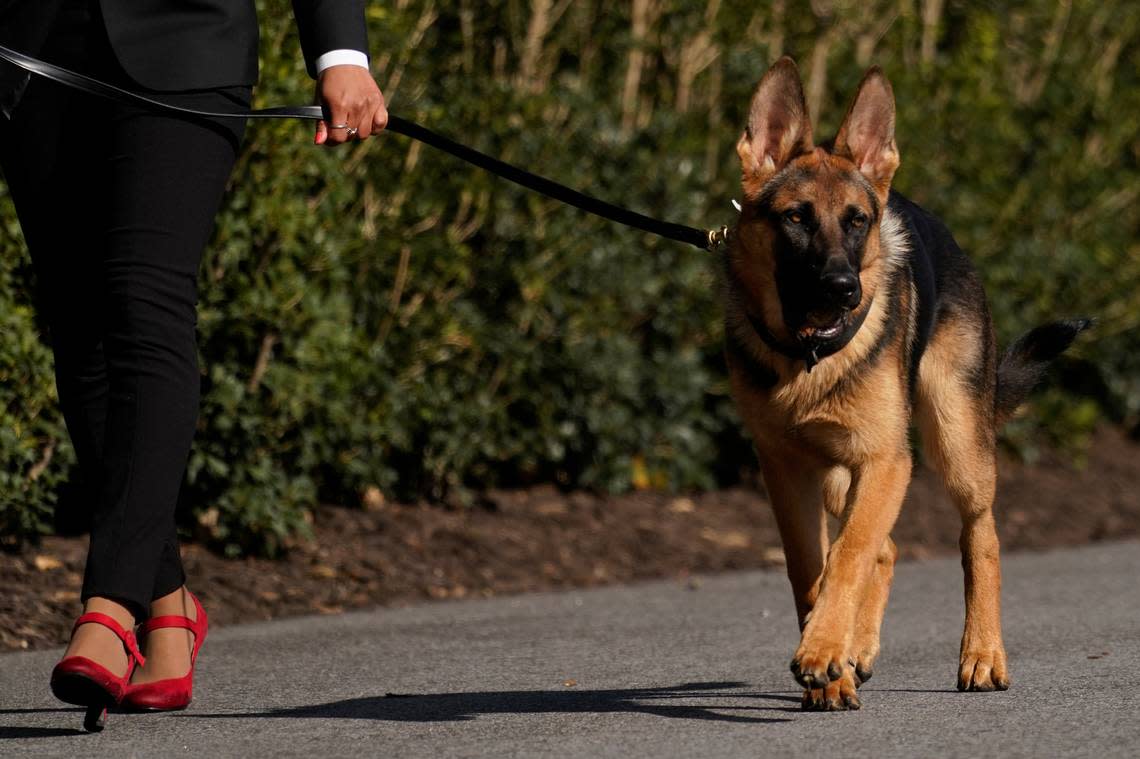Biden’s dog booted from White House. Lions, tigers and bear came before him — literally

- Oops!Something went wrong.Please try again later.
- Oops!Something went wrong.Please try again later.
- Oops!Something went wrong.Please try again later.
- Oops!Something went wrong.Please try again later.
- Oops!Something went wrong.Please try again later.
- Oops!Something went wrong.Please try again later.
Due to safety concerns, President Joe Biden’s dog has been removed from the White House, joining a long line of problematic pets — including lions, tigers and a bear — evicted from the executive mansion.
After moving into the White House in 2021, Commander, a German shepherd, became nothing but trouble for the Secret Service, according to the Associated Press.
The dog, a gift from the president’s brother, reportedly attacked members of Biden’s security detail around a dozen times.
The latest incident, which led to an agent needing medical care, was the final straw, according to the BBC.
“Commander is not presently on the White House campus while next steps are evaluated,” Elizabeth Alexander, a White House spokeswoman, told the BBC, adding that the first family is “grateful for the patience and support of the U.S. Secret Service and all involved, as they continue to work through solutions.”
Throughout its more than two centuries of use, the White House has been home to countless animals, both domesticated and wild.
“Presidents and pets have a long tradition starting with George Washington,” Louis Picone, a presidential historian, told McClatchy News.
Dogs have been some of the most common unelected residents, particularly in recent decades. But at times, the White House has been more menagerie than mansion, bursting with exotic, and sometimes chaotic, creatures.
“While most presidential animals lived in peace inside or on the grounds of the White House,” Picone said, “a few just didn’t work out and had to be exiled from 1600 Pennsylvania Avenue.”
Presidents and their problematic pets
One of the first presidents to court controversy à la animals was Martin Van Buren, who served from 1837 to 1841. Van Buren received two tiger cubs as a gift from the Sultan of Oman, according to the Smithsonian’s National Zoo and Conservation Biology Institute.
Though he wanted to keep the cats, Congress, adopting the role of animal control, forced him to turn them over, saying they belonged to the public.
Grover Cleveland
Following his election, Grover Cleveland, who served as America’s 22nd and 24th president, was given a Newfoundland dog, Picone said.
“Concerned the gift may look like an attempt to curry presidential favors, he returned the dog with a note: ‘The acceptance of presents of value which could involve an obligation I should deem entirely inadmissible… I hope not to offend you by sending the dog by express to you...at my expense,’” Picone said.
Teddy Roosevelt
A few years later, President Theodore Roosevelt, a noted naturalist, took the great outdoors with him to the White House.
“The (Roosevelts) owned several dogs, a lizard, guinea pigs, a real pig, a badger, a macaw, a one-legged rooster, a hyena, an owl, a rabbit, a pony, and even a small bear,” Picone said. “But not all the animals worked out.”
The president’s son purchased the snakes from a pet store before unleashing them in the Oval Office to the terror of unsuspecting guests, Picone said. After they were captured, the scaly creatures were promptly returned to the store.
The president’s bear, a “queer-tempered” creature, was also eventually sent away to a zoo, at which point Roosevelt’s family “breathed a sigh of relief,” according to one of Roosevelt’s memoirs.
President Roosevelt’s dog, a bull terrier named Pete, created his share of headaches as well.
The dog reportedly “sank his teeth into so many legs that he had to be exiled to the Roosevelt home in Long Island,” according to the Clinton White House archives.
President Calvin Coolidge, not to be outdone, also amassed a large flock of fauna in the White House.
He gave new meaning to the Roaring Twenties when he took in a pair of lion cubs from South Africa, according to the Smithsonian Magazine.
The young cats, named Tax Reduction and Budget Bureau, eventually proved too wild for the White House and were sent to the Smithsonian National Zoo.
Coolidge’s family also attempted to raise thirteen Pekin ducks in a White House bathroom, but they soon outgrew the loo and were shipped off to a zoo, according to the Calvin Coolidge Presidential Foundation.
One of Coolidge’s most iconic pets was a raccoon named Rebecca. Although she “ran around the White House knocking over plants, unscrewing jar lids, cavorting in the bathtub and generally living la vida loca,” she never faced eviction, staying with the Coolidges until they left office, according to the Library of Congress.
FDR
Following in the footsteps of his cousin, President Franklin Roosevelt brought a few animals to the White House that caused their fair share of problems.
One of them, a German shepherd named Major, bit several people, including a senator from Arkansas, according to the Huffington Post. After multiple incidents, he was exiled to the Roosevelt family home in New York.
Soon after, a Scottish terrier owned by Eleanor Roosevelt nipped a reporter’s face and was banished as well, according to the outlet.
Jimmy Carter
Jimmy Carter, a peanut farmer turned president, owned a Siamese cat and a Border Collie mix, a gift from his daughter’s teacher.
The dog, named Grits, “had a habit of snapping and a general bad attitude,” Picone said. “The Carters returned the gift and restored peace to the White House.”
If anything is to be learned from all the presidents’ problematic pets, it might be to be wary of accepting animals as gifts.
White House to host Biden’s granddaughter’s wedding. Who else has been married there?
Trump says his arrest is imminent. Only one other president has been arrested — in 1872
Republicans evict some Democrats from their Capitol offices. Here are most desired digs

